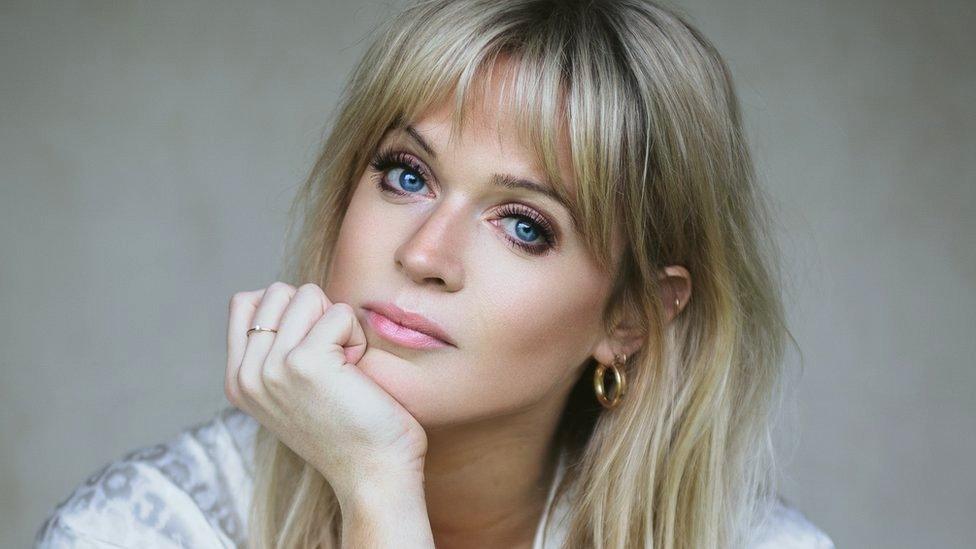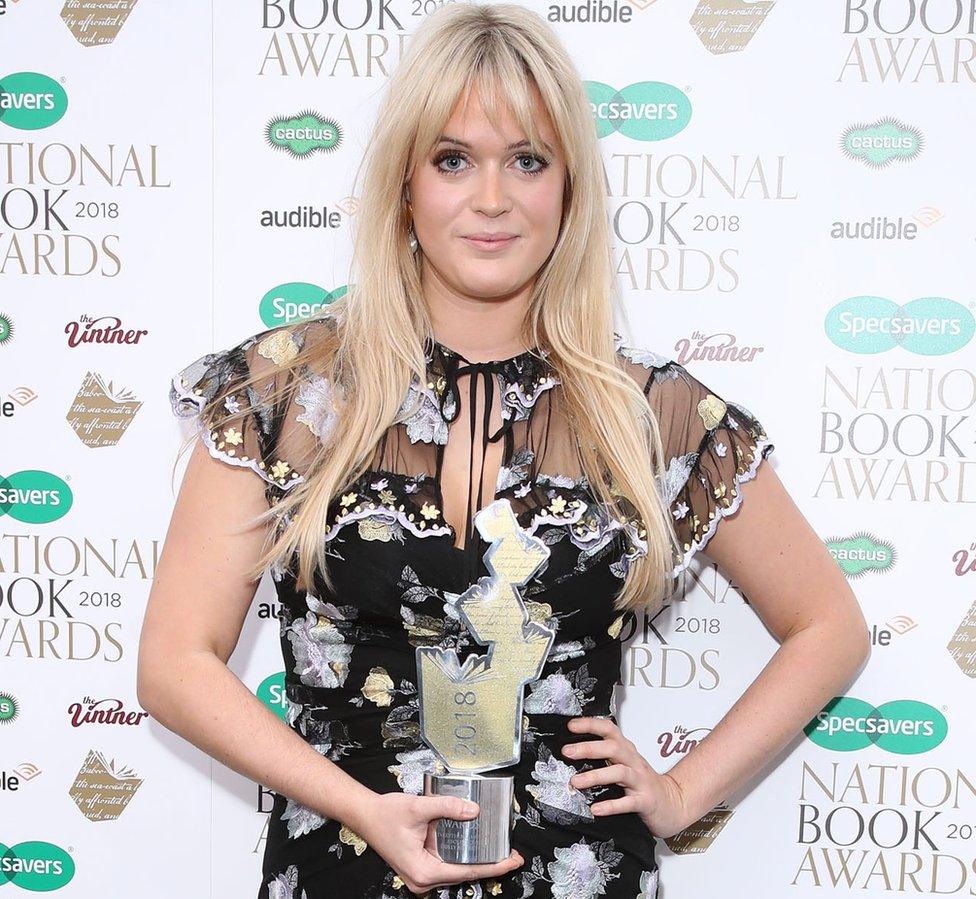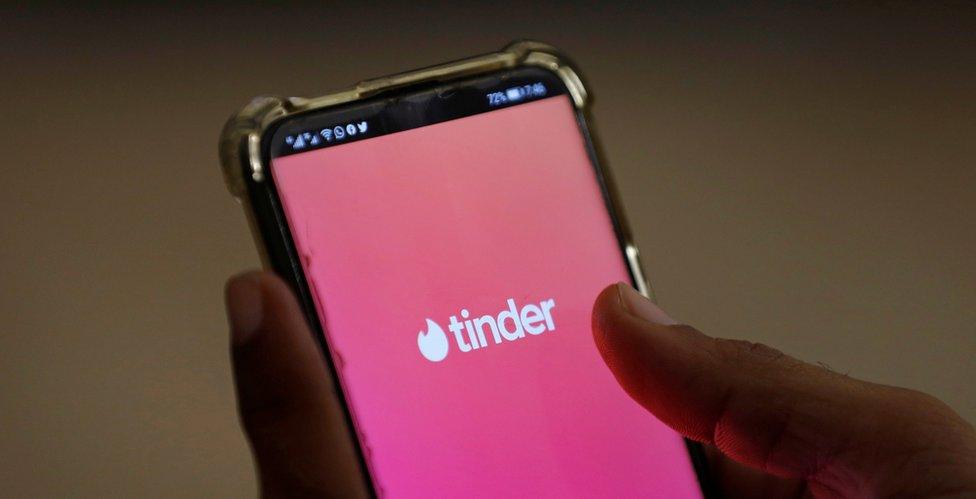Why Dolly Alderton stopped writing about her personal life
- Published

Alderton's memoir Everything I Know About Love sold more than 300,000 copies in the UK
Appropriately for an author, Dolly Alderton used to be an open book.
For several years, she wrote a dating column in The Sunday Times, in which she would share all sorts of stories about being a single woman in her 20s - the successes, disasters, mishaps, and everything in between.
Her 2018 memoir - Everything I Know About Love - lived up to its title, offering readers a frank and deeply personal account of friendships, relationships and growing up as a millennial.
It became a best-seller and struck a chord with women everywhere (and quite a few men). Critics praised her for so beautifully capturing what it was like growing up in the noughties - there's even a section dedicated to the politics of MSN Messenger.
However, Alderton's latest book, Ghosts, sees her switching to fiction; a decision partly driven by her desire to no longer make so much of her personal life public after the huge success of her memoir.
"Put simply, my first book was all my good stories," Alderton tells BBC News. "I had a particular story to tell. And that was also a thematic story that fit neatly into a memoir, which was a story about growing up.
"But also, I just don't want to write about my personal life any more, I have neither the inclination nor the strength to do that," she explains. "Not to say that I regret doing that. I'm really glad I did that for that period of my life. But any desire to do that has completely left me now."
Alderton still writes for The Sunday Times, but now works as an agony aunt, which means the focus is on the many readers who write in seeking advice, rather than herself.

Alderton's best-selling memoir won biography of the year at the National Book Awards
Part of the reason for the change, Alderton says, is she felt in "a much safer place" while writing the memoir that would go on to bring her so much acclaim, because back then she only had "a fraction of people reading and listening to me".
"And I also just grew out of it, I think," she continues. "It takes its toll on you. Living in a way that means that you are constantly looking, in your day-to-day life and in your relationships and your friendships, to find material that will then be immediately put on the page, black and white, presented to the world as who you are and how you live, for that then to be digested, commented on and analysed. That is one hell of a life choice."
But that doesn't make her debut novel any less relatable. Ghosts centres on Nina Dean, a food writer in her early 30s, who starts seeing Max, a man she met on a dating app. She falls in love, but - as you can probably guess from the title - Max then disappears without a trace.
"The reason I wanted to focus on ghosting is it just seemed to be a word that was in the air," Alderton explains. "Everywhere I went, whether it was in editorial meetings, or when I was having conversations with friends, it just seemed to be this thing that was happening. And whenever I spoke to people of an older generation, they seem to be perplexed by it.
"Now, that is not to say that slipping away in a cowardly fashion is something exclusive to millennials. I think the reason why it's been exacerbated in recent times with the dawn of dating app culture is that the accessibility to a variety of options in love is really exciting."

Dating apps like Tinder, Bumble and Hinge have become hugely popular over the last decade
As a result, anyone who spends time on the likes of Tinder, Bumble or Hinge also has to prepare themselves for a different type of dating to previous generations.
"For some people, it engenders this unconscious sense that these aren't real humans, and that we don't owe each other the same sort of accountability and respect and communication that we would if we'd met as humans in real life," Alderton says.
"It can give them this sort of video game anonymity, which means that people aren't people, they're opportunities for experience. So once we're done with one, we just come out of the game and we start a new game."
The novel explores several other contemporary dating concepts, beyond ghosting. Perhaps most interesting of these is what one character refers to as the "Blair Bulge".
"Women with degrees will only rarely marry men without them, but men are less fussy," Nina's friend Eddie opines at a wedding. "Because Tony Blair made more people go to university, there are loads of university-educated women who struggle to find suitable long-term partners. This cohort is the Blair Bulge."
Whether you agree or not, this is one of several intriguing dating theories presented within the pages of Ghosts. But there's a lot more going on in the novel beyond the dating lives of its main characters.
Allow Instagram content?
This article contains content provided by Instagram. We ask for your permission before anything is loaded, as they may be using cookies and other technologies. You may want to read Meta’s Instagram cookie policy, external and privacy policy, external before accepting. To view this content choose ‘accept and continue’.

Nina's increasingly strained relationship with a friend who has recently had children will be relatable to anyone who has experienced a formerly close friendship starting to drift away. Nina also has to cope with an aggressive downstairs neighbour, and come to terms with her dad's worsening dementia.
The novel may not be autobiographical, but writers of fiction are naturally informed by their own everyday lives, as Alderton points out.
"Elizabeth Gilbert, who I've interviewed, she said: 'If people really want to know who I am, they shouldn't read my memoir, Eat, Pray, Love. They should look in between the sentences of my fiction, because that's where I can stand in plain sight.'
"The thing that's really exciting about writing a novel, is it's so much less exposing, because you're not in it explicitly. But you can explore lots of different complicated, difficult, gnarly things about being human and the experiences you've had. And you can do it without having to look at a particular code of conduct, in terms of offending other people who are close to you or potentially making yourself really vulnerable to attack."
Allow Instagram content?
This article contains content provided by Instagram. We ask for your permission before anything is loaded, as they may be using cookies and other technologies. You may want to read Meta’s Instagram cookie policy, external and privacy policy, external before accepting. To view this content choose ‘accept and continue’.

When she isn't writing novels or newspaper columns, Alderton co-hosts her weekly culture podcast The High Low alongside fellow writer Pandora Sykes (the pair are pictured above, pre-social distancing).
The recent lockdown may have seen a plethora of new podcasts launched as people found themselves with more time on their hands, but Alderton isn't worried about the increasingly crowded marketplace.
"I don't think it's becoming too saturated at all," Alderton says. "In this country, there are very particular gatekeepers of who gets to tell their stories, in what timeslot, and with how much marketing behind them. And that is across the board, in television, in radio, and in publishing and journalism.
"Now, here is one space of democracy [where] if you want to start a podcast, you start a podcast, what do you need? You need one or two mics. It's an investment of £50, you start a podcast, you hone your skill, you collect your audience, you put it out there in the world.
"In terms of contextualising it against the rest of the cultural landscape, it's as democratic as we can find so far. That's something we should celebrate."

Ghosts by Dolly Alderton is released on Thursday.